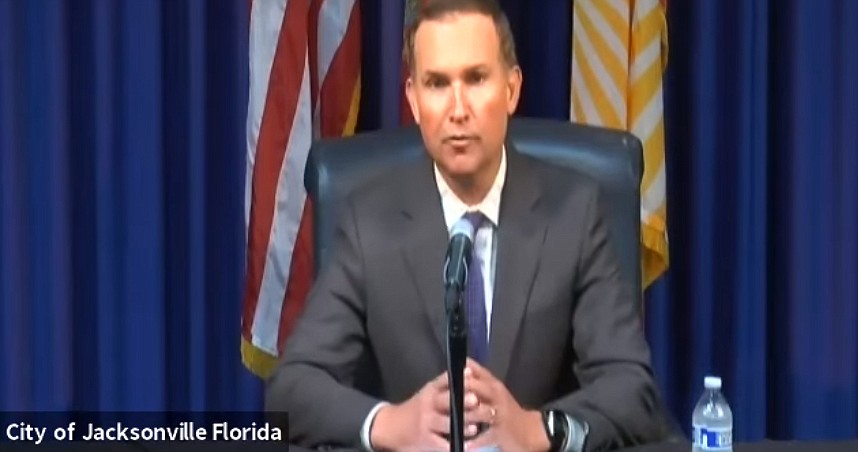
Jacksonville residents approve of the job Mayor Lenny Curry is doing to address the coronavirus pandemic, according to a poll released April 6 by the Public Opinion Research Lab at the University of North Florida.
The poll found that 26% strongly approve and 44% somewhat approve of his job, while 12% somewhat disapprove, 12% strongly disapprove and 6% said they didn't know.
A majority of Jacksonville respondents also approved of the measures taken by local government, with 56% agreeing that they are appropriate, 38% that they haven't gone far enough and 6% that they have gone too far.
The state response to slow COVID-19 didn’t fare as well, with 61% of Duval respondents saying it didn’t go far enough, 33% that it was appropriate and 6% that it went too far. Statewide poll results were similar.
The statewide poll of 3,244 registered Florida voters was administered from March 31 through April 4 through an online survey. Of those, 489 were from the Duval area. The margin of sampling error for the total sample is +/-1.7 percentage points.
Reaction to the job of other political leaders was mixed.
In Jacksonville, the poll found 48% strongly or somewhat approve of the job President Trump is doing to address the pandemic, with 52% disapproving. Gov. Ron DeSantis received 51% approval, with 48% disapproving.
Dr. Anthony Fauci, the country's top infectious disease expert, received the highest rating with 88% approval.
The Duval poll results mirrored those statewide.
“Relative to Trump and DeSantis’ support, mayors and local government have filled the leadership void and been rewarded with high levels of support,” said Michael Binder, director of the Public Opinion Research Lab, in a news release.
“Even though this job approval was asked specifically about the COVID-19 response, a mayor like Curry who has had a really tough year, has at least turned public opinion on this issue.”
In Jacksonville, 92% are very or somewhat concerned in general about the COVID-19 pandemic, while 21% of respondents know someone who has tested positive.
A majority of Jacksonville respondents, 79%, are very or somewhat concerned about personally contracting the virus.
“Given the massive disruption of our daily lives and serious nature of the pandemic, it is no wonder to see high levels of concern about COVID-19,” Binder said.
“Current projections about death totals and forthcoming economic problems have been nothing short of terrifying.”
Nearly all polled are concerned about the long-term economic impact of COVID-19, with 93% very or somewhat concerned. Additionally, 80% are concerned about the impact of the virus on their personal finances.
The poll found that 26% say someone in their household has had their hours cut at work and 20% have someone in their household who has been laid off.
However, when asked which was more concerning, 70% of respondents chose public health effects of COVID-19 over the economic impacts.
Additionally, 50% say someone in their household is working from home.
The poll also asked about items people were having trouble obtaining.
In Duval, cleaning products topped the list at 38%, followed by paper products at 35% and fresh meat or seafood at 8%.
The poll also asked about mental health, with 64% of Duval respondents saying, in general, they have felt somewhat or very anxious.
To go outdoors to relax or unwind, 34% of Jacksonville residents say they have gone outside every day, less than the 41% statewide average.
“Mental health is a key aspect of public health, and as the pandemic drags on, we can expect heightened levels of anxiety,” Binder said. “Outdoor activities conducted with caution may become essential to maintaining overall health as we progress into greater periods of advised confinement and restriction.”
Finally, respondents were asked about a potential matchup for the upcoming presidential election between Republican Trump and Democrat Joe Biden.
In Duval, 45% backed Biden, 37% backed Trump, 10% didn’t know and 8% wouldn’t vote. Statewide, Biden was at 46%, Trump 40%, 8% didn’t know and 6% wouldn’t vote.
“I would exercise caution when looking at these numbers, first these are registered voters – not likely voters; second, the campaign season has screeched to a grinding halt and people are rightly less focused on politics,” Binder said.
“Although, this same sample of voters when asked who they voted for in 2016, indicated a very slight advantage for Trump, suggesting that something may be changing in Florida ahead of the election.”
To download a PDF of the poll, click here